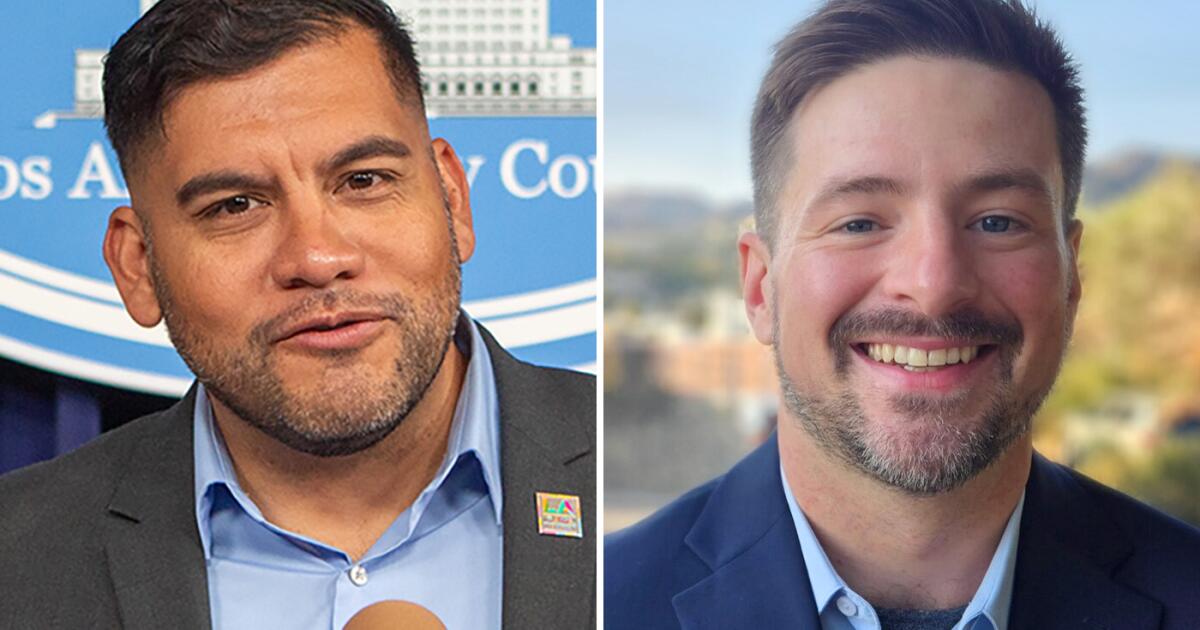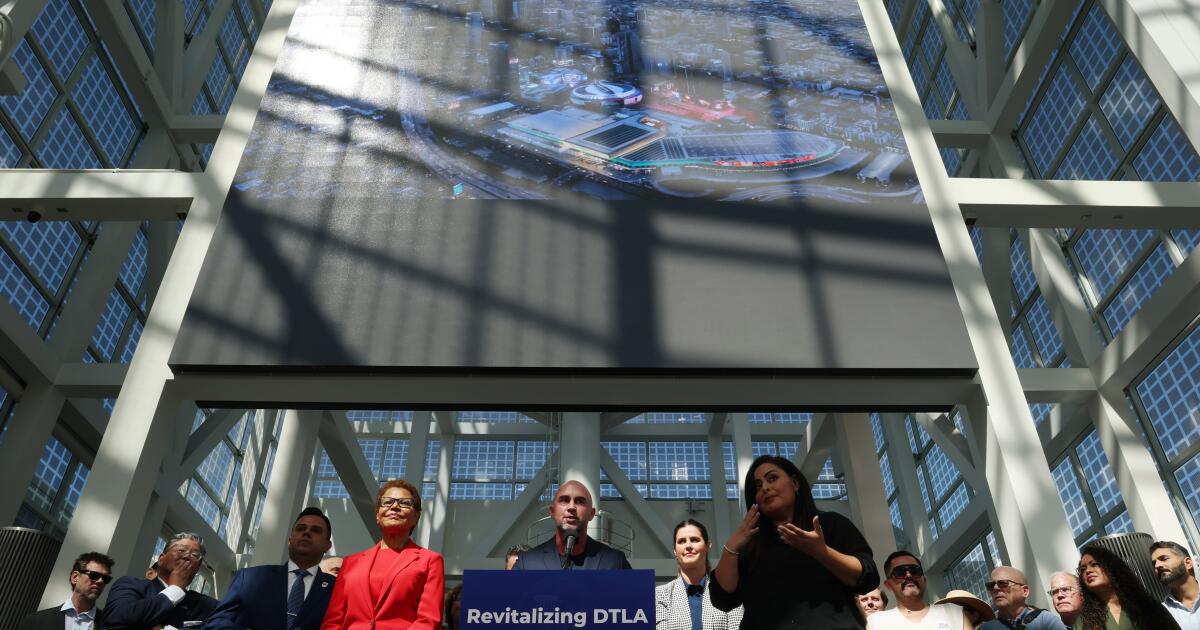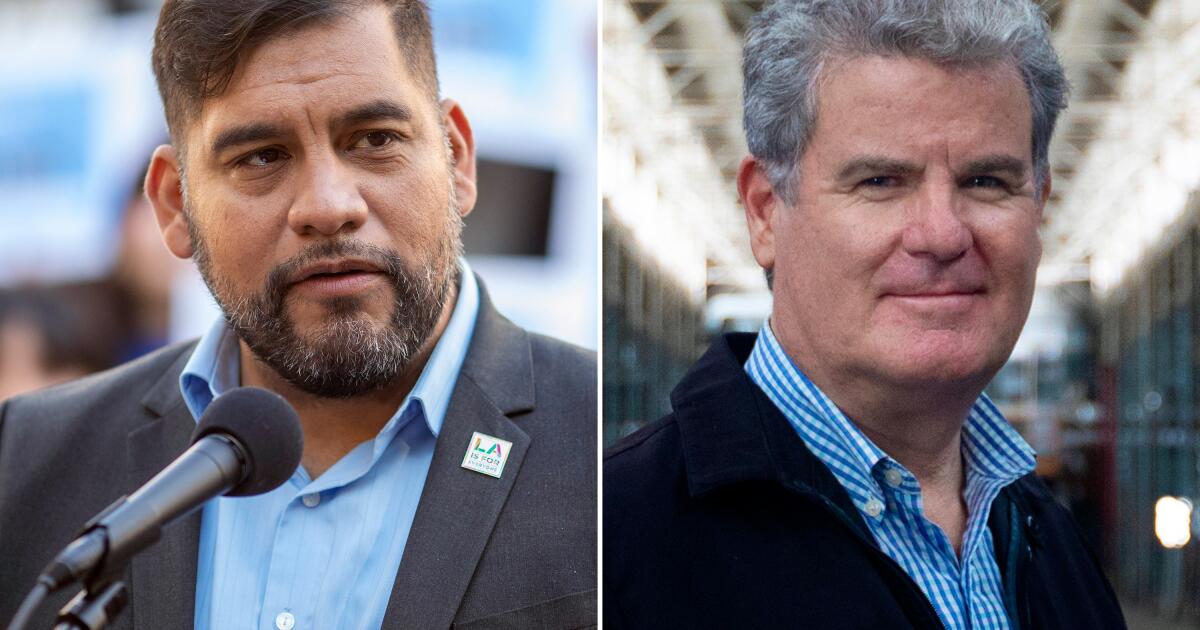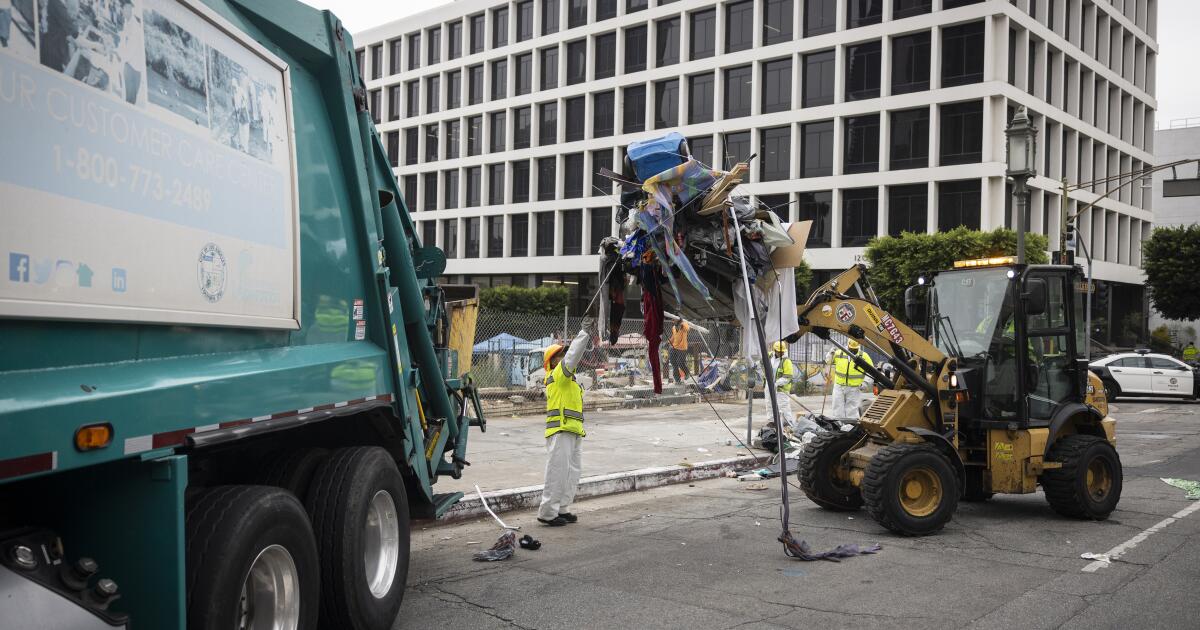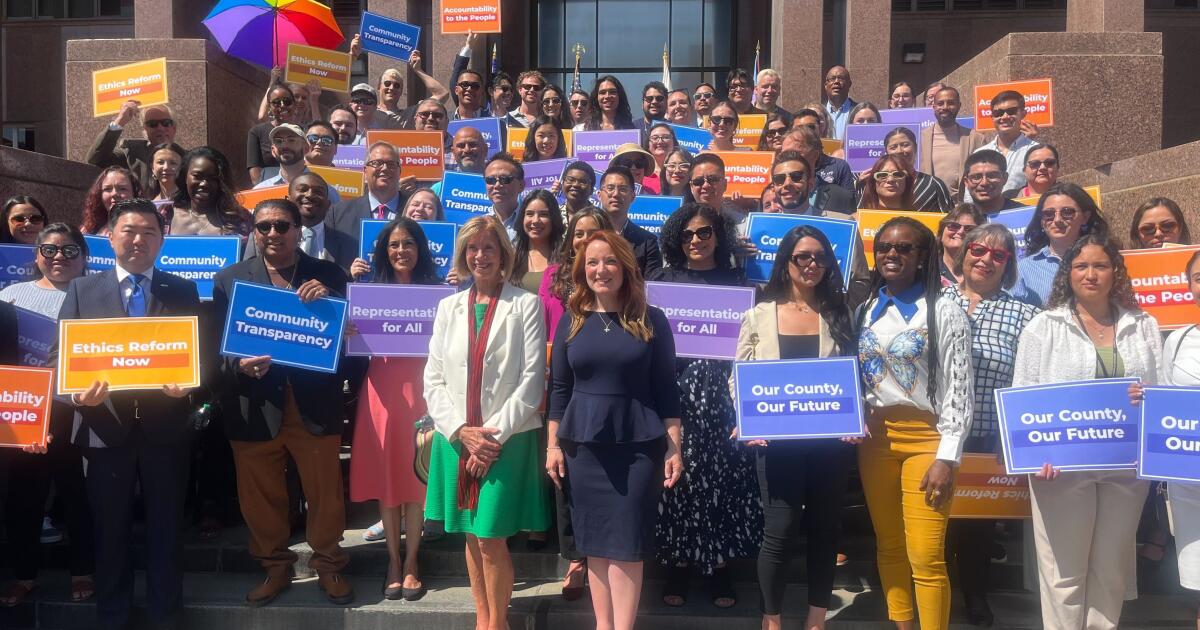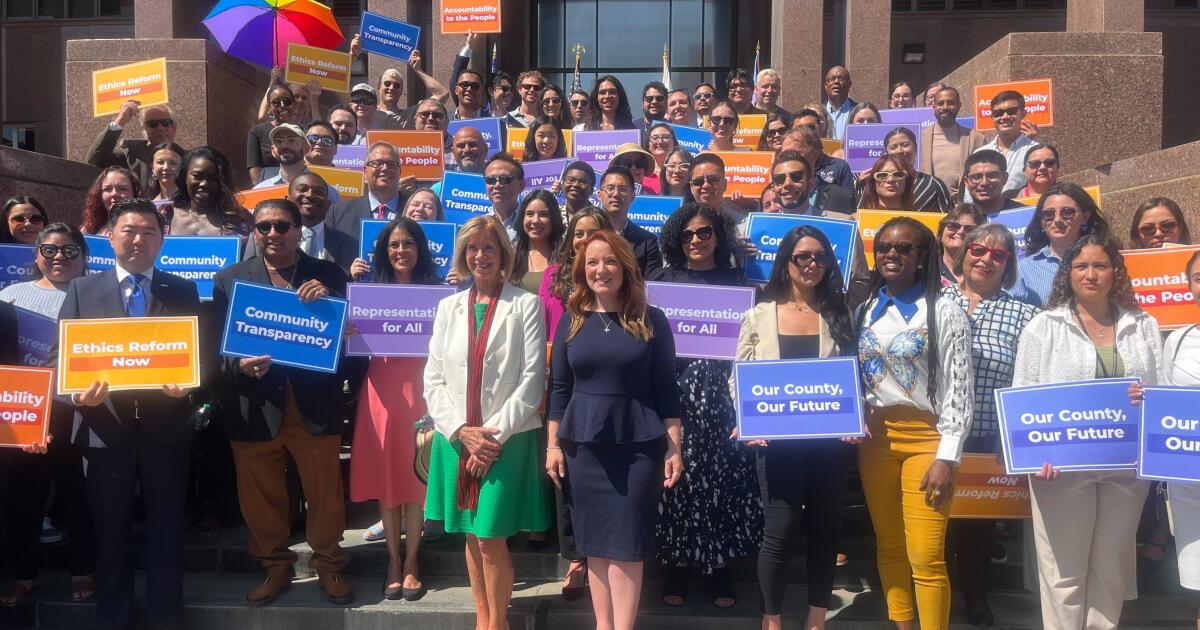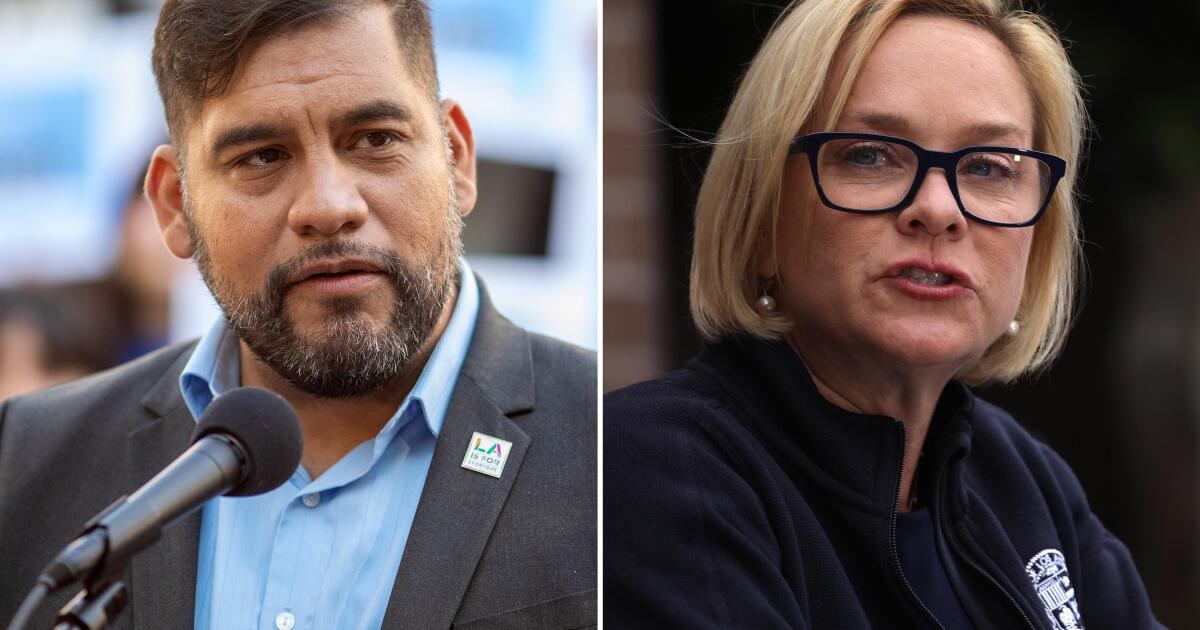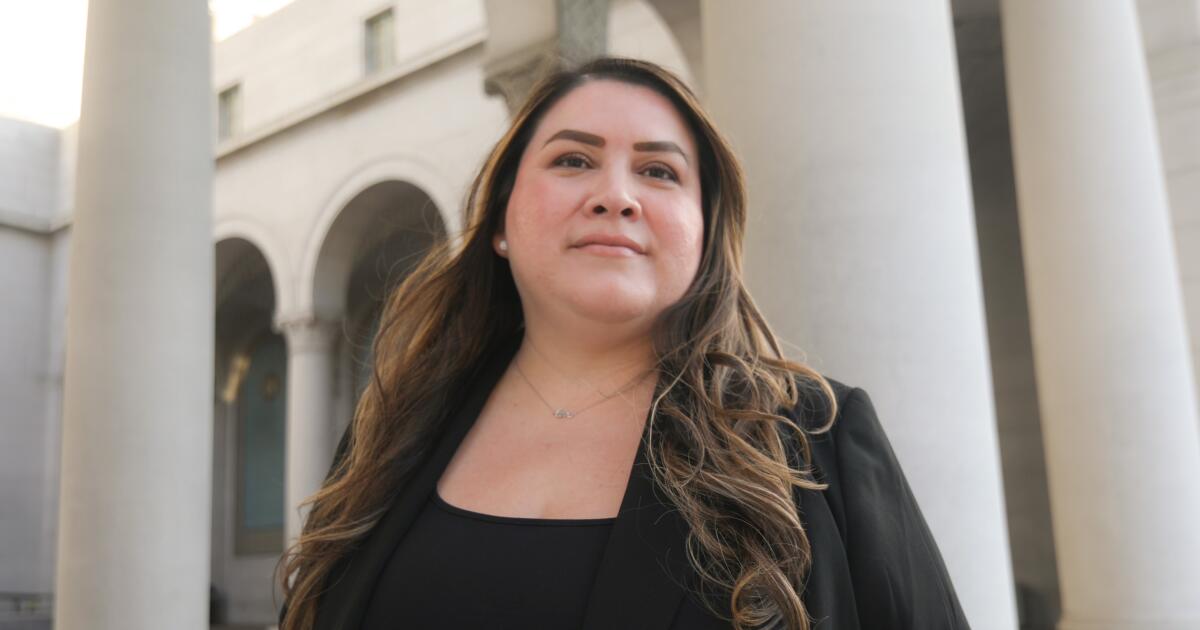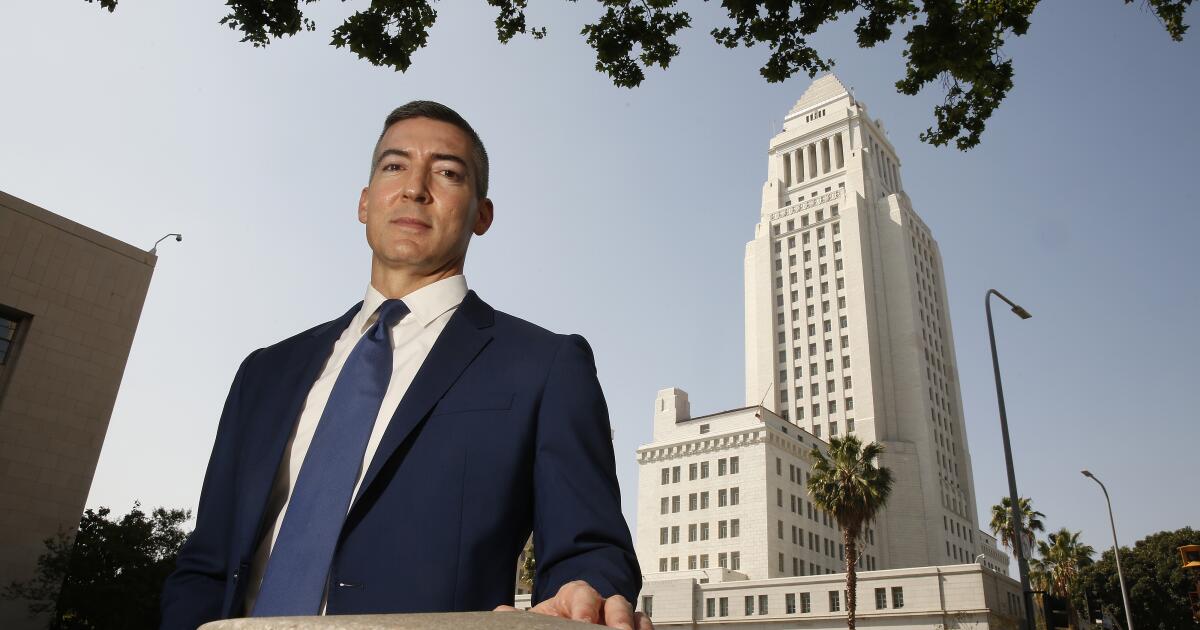City Controller Kenneth Mejia gets a meaty new assignment
Good morning, and welcome to L.A. on the Record — our City Hall newsletter. It’s David Zahniser, with an assist from Rebecca Ellis, Noah Goldberg and the esteemed Julia Wick, giving you the latest on city and county government.
For nearly three years, Los Angeles City Controller Kenneth Mejia has been trying to use his office to dig deep on the city’s homelessness programs — how they’re run and, more importantly, how effective they are.
The road so far has been a bit bumpy.
Early in his tenure, Mejia sent staffers to the Westside to monitor Mayor Karen Bass’ Inside Safe program, which moves unhoused people into hotels and motels. He quickly pulled back after facing resistance within City Hall.
A year later, Mejia offered to have his office conduct a court-ordered audit of the city’s homelessness programs. The work went to a private firm instead, at a cost to taxpayers of nearly $3 million.
Mejia also promised to produce a “focused audit” on Inside Safe, the mayor’s signature homelessness initiative, which has not materialized.
At one point, he even posted an Instagram video of himself and his staff doing choreographed moves to Kendrick Lamar’s “Not Like Us,” to explain why he hadn’t audited the program. The video displayed the words: “We tried. We tried. We tried.”
But this week, the city’s top accountant got his big break, securing a plum role in the high-stakes legal battle over homelessness between the city and the nonprofit L.A. Alliance for Human Rights. That fight hinges on whether the city is living up to its commitment, enshrined in a legal settlement, to clear encampments and build more homeless beds.
On Tuesday, U.S. District Judge David O. Carter assigned attorney Daniel Garrie, an expert in cybersecurity and computer forensics, as a new third-party monitor to determine whether the city is truly on track to open 12,915 new homeless beds and remove nearly 10,000 encampments, as required by the settlement.
Carter tapped Mejia to serve as a liaison between Garrie and the city, calling him the “most knowledgeable person” on homelessness funding. In a six-page order, the judge said the city controller would support Garrie by “facilitating data access.” He also said Mejia would be less expensive than former City Controller Ron Galperin, who was also under consideration and expected to charge $800 an hour.
The judge’s order was well-timed, coming at a moment of heightened scrutiny over homelessness initiatives in L.A. and across the region.
On Thursday, federal prosecutors accused two real estate executives of misappropriating millions of dollars in state funds allocated in the region’s fight against homelessness. According to prosecutors, one of them engaged in bank fraud, identity theft and money laundering — purchasing a property on L.A.’s Westside and quickly flipping it for more than double the price to Weingart Center Assn., a nonprofit housing developer that received city funds to build interim homeless housing.
Mayoral candidate Austin Beutner, the former schools superintendent who spent some time at City Hall, also turned up the heat, calling this week for Bass to let Mejia audit the city’s homeless programs. He made that pitch after Rand researchers concluded that the region’s yearly homeless count is not accurately tracking homeless people who don’t live in tents or cars.
“The Mayor is blocking the elected Controller from auditing the City’s efforts,” Beutner said on X. “We need an immediate audit to tell us how much is being spent, on what, and whether it’s having any impact.”
Bass spokesperson Clara Karger, in an email to The Times, said the mayor and the city controller “work well together” on various issues, including a recent audit of the city’s housing department.
Asked whether Bass refused to participate in Mejia’s planned Inside Safe audit last year, Karger replied: “A city elected official should not conduct a performance audit of another elected official.”
“Inside Safe has robust oversight systems in place,” she said. “There are hundreds of pages of publicly available reports on Inside Safe and an assessment of Inside Safe was completed under the Alliance settlement.”
City Atty. Hydee Feldstein Soto declined to weigh in on Carter’s order. But she has previously pointed to a 16-year-old legal ruling barring the city controller from conducting performance audits of other elected officials.
“The legal advice from the City Attorney’s Office is known to our clients and has not changed over the years,” said Feldstein Soto spokesperson Karen Richardson.
The judge’s order may only be the beginning.
Mejia has been urging the city’s Charter Reform Commission to propose language that clearly gives him the power to audit programs overseen by his fellow elected officials. Such a move would erase any doubts about whether he has the legal standing to scrutinize Inside Safe.
The debate over the powers of the city controller goes back decades. In 2008, then-City Controller Laura Chick clashed with City Atty. Rocky Delgadillo over her attempt to audit his office’s workers compensation unit. The following year, right before Chick left office, a judge sided with Delgadillo and found that the controller lacked the authority for the audit.
In the short term, Carter’s order could give Mejia new leeway to identify lax oversight of L.A.’s homelessness programs, offering the public fresh insight into how closely they are tracked, and possibly identifying waste or fraud.
Mejia declined interview requests from The Times. Last month in federal court, he dazzled Carter with his office’s online dashboards, which show expenditures not just for Inside Safe but many other homelessness programs.
Carter praised the work of Mejia and his team, according to a transcript of the proceedings. Mejia, in turn, said his office enjoys the work but sometimes struggles to carry it out with its existing staff.
“Some of these contracts are 400 pages,” he said. “And so right now, we have a two-person team who is doing all of that and putting all this together.”
Attorney Elizabeth Mitchell, who represents the L.A. Alliance, welcomed the selection of Mejia, saying he’s clearly been pushing to get more involved in the case.
“My only concern is, I don’t know if he will engender a lot of cooperation from the city, because they don’t seem inclined to cooperate with him,” Mitchell said.
That wasn’t the message from Councilmember Tim McOsker, who voiced alarm in recent months over the costly bills submitted by the outside law firm handling the L.A. Alliance case for the city. McOsker, who spent several years in the city attorney’s office, expressed confidence in Mejia’s abilities and said the decision to pick him would be cost effective.
“It is imperative that we give value to the taxpayers of the city of Los Angeles,” he said.
State of play
— BEUTNERPALOOZA: After weeks of speculation, Beutner jumped into the June 2026 race for mayor. His team got off to a choppy start last weekend, uploading “Austin for LA Mayor” images to his social media accounts before he had even made a formal announcement, then abruptly taking them down. Hours later, Beutner formally went public, blasting Bass over the city’s handling of the Palisades fire, which destroyed his mother-in-law’s home and severely damaged his Pacific Palisades home.
By Monday, Beutner had released a video announcing his campaign, which assailed Trump over his immigration crackdown. Two days later, he appeared with supporters in San Pedro, repeating his warning that the city is “adrift.”
— DEFINE ADRIFT: The following morning, Bass joined former Councilmember Mike Bonin, director of the Pat Brown Institute for Public Affairs, to discuss politics, leadership and her tenure. She took issue with Beutner’s characterization of L.A. as “adrift,” saying the city has been through “multiple shocks this year,” including a catastrophic firestorm and “being invaded” by federal authorities in June.
The talk took place on the 72nd floor of the U.S. Bank Tower, offering a staggeringly beautiful post-rain city view, which offers a good excuse to revisit former California poet laureate Dana Gioia’s classic poem, “Los Angeles After the Rain.”
— FIERCE AMBITION: Is L.A. County Supervisor Lindsey Horvath running for mayor of Los Angeles? The former West Hollywood mayor hasn’t ruled it out — and moved to the city a few months ago.
— WE’RE NOT IN TEXAS ANYMORE: Two more plaintiffs in L.A. County’s $4-billion sex abuse settlement have come forward to say they were told to invent their claims in exchange for cash. The allegations follow a Times investigation published earlier this month that found seven plaintiffs who claimed they received cash from recruiters to sue the county over sex abuse. Downtown LA Law Group, which filed cases for the plaintiffs, has denied involvement with the alleged recruiters.
— BUT WAIT, THERE’S MORE: Meanwhile, the county is preparing to pay out an additional $828 million to another group of plaintiffs who say they were sexually abused in county facilities.
— GETTING OUT THE VOTE: Real estate developer Rick Caruso, the is-he-or-isn’t-he potential mayoral/gubernatorial candidate, is sending mailers to more than 45,000 voters who lived in fire-damaged sections of Pacific Palisades, Malibu and Altadena and now have temporary addresses. He advised them on how to update their voter registration by listing a temporary mailing address while also remaining in their original voting district, according to a Caruso spokesperson. Caruso is paying for the effort, which is nonpartisan and doesn’t mention any specific election. His team declined to provide the cost.
—SPEAKING OF CARUSO: Politico took a look at the mall magnate’s recent travels around the state, which have fueled speculation that he’s leaning toward a gubernatorial bid. The outlet reported that Caruso, who self-financed his 2022 mayoral campaign, recently met with Democratic megadonors Haim Saban and Ari Emanuel.
— THREE’S COMPANY: East Hollywood resident Dylan Kendall filed paperwork this week to challenge incumbent Hugo Soto–Martínez in next year’s race to represent Hollywood, Silver Lake, Echo Park and other neighborhoods. Kendall, a business owner who previously worked at the Hollywood Chamber of Commerce, cited quality-of-life issues as the impetus for her candidacy. Political consultant Michael Trujillo and fundraiser Kat Connolly have joined her campaign. (One of Soto-Martínez’s upstairs neighbors, Colter Carlisle, is also running.)
— MORE FALLOUT FROM G: L.A. County Chief Executive Fesia Davenport received a $2-million payout this summer after telling the county supervisors she had experienced professional fallout from Measure G, a voter-approved ballot measure that will soon make her job obsolete.
— 1,000 DAYS LEFT: Bass reminded Angelenos on Friday that the start of the 2028 Olympic Games is just 1,000 days away. Appearing in Venice, she signed an executive directive streamlining preparations for the international event.
— BYE, JULIA: We are super bummed to report that this was erstwhile City Hall reporter Julia Wick‘s last week at The Times. She will miss all of you. But she says please keep in touch!
QUICK HITS
- Where is Inside Safe? The mayor’s signature program to combat homelessness went to Hollywood this week, focusing on the area around Santa Monica Boulevard and Heliotrope Drive in Soto-Martínez’s district.
- On the docket next week: The council’s public works committee takes up the issue of long-delayed sidewalk repairs, including the city’s obligations to make them wheelchair accessible.
Stay in touch
That’s it for this week! Send your questions, comments and gossip to [email protected]. Did a friend forward you this email? Sign up here to get it in your inbox every Saturday morning.


